Mental health and wellness are crucial aspects of our lives that impact us physically, emotionally, and spiritually.
In our fast-paced lifestyle, it can be difficult to manage stress and prioritize self-care.
However, taking care of our mental health is essential to prevent mental illnesses and improve overall well-being.
We’ve compiled ten life-changing tips that you can implement in your daily routine to improve your mental health and wellness.
1)) Practice Mindfulness
Mindfulness is the practice of being present at the moment, fully aware of your thoughts, emotions, and body sensations.
Mindfulness practices like meditation, yoga, or deep breathing can help reduce stress, anxiety, and depression, and promote overall well-being.
Tips to Enhance Your Mindfulness Practice
- Set a Routine: Establishing a regular routine for mindfulness practice can help in making it a part of your daily life. Choose a specific time each day, preferably in the morning or before bed, to dedicate to mindfulness activities like meditation or yoga.
- Cultivate a Mindful Environment: Create a serene, clutter-free space where you can practice mindfulness. This space should be quiet and free from distractions, allowing you to focus on your thoughts and sensations.
- Start Small: Begin your mindfulness journey with just a few minutes a day, gradually increasing the duration of your practice. The consistency of practice is more important than the length of each session.
Incorporating mindfulness into your daily routine can significantly improve your mental health and wellness.
It empowers you to live in the present moment and take control of your thoughts and emotions, reducing stress and promoting inner peace.
The journey towards mindfulness is a gradual one—patience, consistency, and a positive outlook are key.
With time, you'll notice a transformation in your mental state, and ultimately, your overall well-being.
2)) Build Healthy Relationships
Healthy relationships play a significant role in building resilience, reducing stress, and improving mental health.
Spend time nurturing relationships with family, friends, or a support group to build a sense of community, connection, and belonging.
Tips to Foster Healthy Relationships
- Open Communication: Clear and honest communication is the foundation of any healthy relationship. Share your thoughts, feelings, and concerns openly, and encourage others to do the same. This leads to mutual understanding and strengthens your bond with others.
- Show Appreciation: Regularly express your gratitude for the people in your life. Show appreciation for their presence, their actions, and their support. This not only strengthens your relationships but also promotes positive emotions.
- Set Boundaries: Healthy relationships require respect for personal space and boundaries. Understand and respect the other person's needs for personal time and space, and communicate your own boundaries clearly. This helps in maintaining a balanced and respectful relationship.
Cultivating healthy relationships is a vital aspect of overall mental health and wellness.
By fostering open communication, showing appreciation, and respecting personal boundaries, we can enhance our connections with others, creating an enriching social environment.
A healthy relationship is a two-way street and plays a key role in our happiness, resilience, and sense of belonging.
3)) Exercise Regularly
Regular exercise not only promotes physical health but also improves mental health by releasing endorphins, reducing stress, and boosting self-esteem.
Owning home workout equipment has been proven to have many mental health benefits.
Research has found that physical activity can reduce symptoms of depression, decrease stress, anxiety, and fatigue, and increase overall well-being.
Owning home workout equipment can be highly motivating and help individuals stay balanced mentally and emotionally.
Find an exercise routine that suits your needs and stick to it.
Tips to Maintain Regular Exercise
- Create a Workout Schedule: Set aside specific days and times for exercise in your weekly schedule. By designating set times, you're more likely to stick to your workout plan and make it a part of your routine.
- Choose Activities You Enjoy: Exercise doesn't have to be a chore. Find an activity you genuinely enjoy, whether it's dancing, hiking, cycling, or even just walking. The key is to make your workouts enjoyable so that you're more likely to stick with them.
- Invest in Home Workout Equipment: Having workout equipment at home can make it easier and more convenient to get regular exercise, especially during inclement weather or when time is tight. Start with basic equipment like dumbbells, resistance bands, or a yoga mat, and gradually add to your home gym as needed.
Maintaining a regular exercise routine significantly contributes to overall mental and physical well-being.
It serves as a natural mood booster, stress reducer, and a powerful tool for building resilience and self-esteem.
Consistency is key, and even small amounts of physical activity can yield substantial health benefits.
So, invest in a routine that brings you joy, and let exercise be your companion on the journey to improved mental health.
4)) Connect With Nature
Incorporating nature into your daily routine by going for a walk, spending time in the park, or strolling along the beach can reduce stress, improve mood, and increase creativity.
Nature has a calming effect that can help you feel more relaxed and recharged.
Tips to Incorporate Nature into Your Routine
- Take Regular Nature Walks: Incorporate a daily or weekly walk in natural surroundings into your routine. This could be a stroll in the local park, a hike in the woods, or a walk along the beach. Nature walks not only provide physical exercise but also offer mental rest and rejuvenation.
- Create a Green Space at Home: If you have a garden, utilize it to cultivate plants or even start a small vegetable garden. If you're living in an apartment, you can set up indoor plants or create a small balcony garden. Surrounding yourself with greenery can boost your mood and create a calming atmosphere.
- Engage in Outdoor Activities: Find an outdoor activity that you enjoy, such as bird watching, photography, cycling, or outdoor yoga. These activities allow you to spend more time in nature while doing something you love.
Incorporating nature into your daily lifestyle can have profound effects on your mental well-being.
The tranquility it offers helps alleviate stress, invigorate your senses, and enhance creativity.
A simple walk in the park, gardening, or engaging in outdoor activities regularly can significantly improve your mood and overall mental health.
Nature is our greatest healer; make it a point to connect with it regularly to experience its calming and restorative powers.
5)) Practice Gratitude
Gratitude is not only about counting your blessings but also about being present in the moment and mindful of the good things you have in your life.
Practicing gratitude daily can increase positive emotions, reduce stress, and improve overall well-being.
Tips to Cultivate a Habit of Gratitude
- Keep a Gratitude Journal: Develop the habit of writing down three things you are grateful for each day. This could be as simple as a beautiful sunset, a kind gesture from a stranger, or a personal achievement. The act of writing fosters mindfulness and helps to maintain a positive perspective.
- Express Gratitude to Others: Take the time to express your appreciation to the people in your life. This could be verbal appreciation, a thank you note or a small gesture of kindness. Expressing gratitude not only uplifts the receiver but also reinforces your own sense of gratitude.
- Practice Mindful Appreciation: At various points in your day, pause and take a moment to appreciate your current situation. This could be enjoying a meal, acknowledging a pleasant environment, or recognizing an accomplishment. Mindfulness enables you to fully experience and appreciate the present moment.
Cultivating a habit of gratitude can be a transformative practice, fostering a deeper appreciation for life's simple pleasures and enhancing overall well-being.
Regularly expressing appreciation, whether it's towards others or for the positive aspects of your life, can significantly shift your perspective towards positivity and contentment.
Gratitude is a journey of self-discovery that encourages mindfulness and celebrates the goodness in life.
Embrace this practice to pave the way for increased positivity, reduced stress, and a more fulfilling life.
6)) Set Realistic Expectations
Setting realistic expectations for yourself and others can help reduce stress, anxiety, and disappointment.
Break down tasks into smaller, achievable goals, and celebrate each milestone along the way.
Strategies for Setting Realistic Expectations
- Start with Small, Achievable Goals: Instead of aiming for large, daunting targets, break down your goals into smaller, manageable tasks. Celebrate each small victory as a step towards achieving your ultimate goal, which can keep your motivation and morale high.
- Practice Self-Compassion: Remind yourself that it's okay to not be perfect and to make mistakes. Self-compassion reduces self-criticism, which often leads to setting unrealistic expectations.
- Regularly Review and Adjust Your Expectations: Constantly assess your expectations and make necessary adjustments. Understand that it's okay to readjust your goals based on changing circumstances or new information. This flexible approach prevents disappointment and perpetuates a more positive outlook.
Setting realistic expectations is a vital element in maintaining a balanced and stress-free life.
By breaking down large goals into smaller, manageable tasks, practicing self-compassion, and reassessing expectations as needed, you can foster a sense of achievement and enhance your mental well-being.
Remember that progress, not perfection, is the key to success. With realistic expectations, you can navigate life's challenges more effectively and embrace a healthier, more positive outlook.
7)) Eat A Balanced Diet
Eating a healthy diet rich in vegetables, fruits, lean meats, and whole grains can improve mood, cognitive function, and overall health.
Avoid processed sugars, saturated fats, and alcohol, which can worsen mental health and lead to addiction.
Guidelines for Maintaining a Balanced Diet
- Include a Variety of Nutrients: Ensure your diet contains a diverse range of nutrients. Incorporate different colored fruits and vegetables, lean proteins, whole grains, and healthy fats into your meals. This variety helps you get the wide range of vitamins, minerals, and fiber your body needs.
- Hydrate Adequately: Drinking water is an essential part of maintaining a healthy diet. It aids in digestion, keeps your skin healthy, and helps you feel full, which can prevent overeating.
- Mindful Eating: Pay attention to your body's hunger and fullness cues. Avoid emotional eating and try to eat at regular intervals to prevent unnecessary snacking or overeating. Make mindful choices about what you consume, prioritizing healthful options over convenience or emotional comfort foods.
Adopting a balanced diet is a crucial step toward improving your physical health and mental well-being.
By incorporating a variety of nutrients, staying well-hydrated, and practicing mindful eating, you can enhance your energy levels, mood, and overall health.
A healthy diet is not just about restriction or weight loss.
It is about nourishing your body with the right nutrients and enjoying a diverse range of foods that contribute to a healthier, happier life.
8)) Prioritize Sleep
A good night’s sleep is crucial for mental health and wellness.
Establish a nighttime routine, avoid gadgets before bedtime, and create a comfortable sleep environment to improve sleep quality and duration.
Tips to Improve Sleep Quality
- Establish a Regular Sleep Schedule: Try to go to bed and wake up at the same time every day, even on weekends. This can help regulate your body's internal clock and promote better sleep at night.
- Create a Restful Environment: Ensure your bedroom is dark, quiet, and cool. Consider using earplugs, an eye shade, a fan, or a white noise machine to create an environment conducive to sleep.
- Limit Exposure to Screens Before Bedtime: The light emitted by phones, tablets, computers, and TVs can interfere with your body's production of melatonin, making it harder to fall asleep. Try to turn off these devices at least an hour before bed.
Good sleep is not a luxury, but a necessity for overall health and wellbeing.
By establishing a regular sleep schedule, creating a restful environment, and limiting screen time before bed, you're setting yourself up for better-quality rest.
Adequate sleep is as important as a balanced diet and regular exercise, and should not be neglected.
Prioritize your sleep to enhance your mood, improve your cognitive function, and support your overall health.
9)) Practice Self-Care
Self-care is about prioritizing your needs and taking time for yourself to recharge and rejuvenate.
Whether it’s taking a bubble bath, reading a book, or going for a massage, make self-care a priority to improve mental health and overall well-being.
Strategies for Effective Self-Care
- Establish a Regular Routine: Develop a routine that includes activities you enjoy and find relaxing. This could be anything from reading a book to practicing yoga or even gardening. Regularly dedicating time to these activities can greatly enhance your well-being.
- Stay Connected: Spend time with people who uplift and support you. Relationships play a crucial role in mental health, so make time for social activities with friends and family.
- Take Care of Your Physical Health: Physical health impacts mental well-being. Therefore, maintaining a balanced diet, getting regular exercise, and ensuring adequate sleep should be part of your self-care routine.
Self-care is a key element in maintaining mental well-being and overall health.
By establishing a routine of enjoyable, relaxing activities, staying connected with loved ones, and taking care of your physical health, you're investing in your emotional wellness.
Self-care isn't a luxury, but a necessity. It's all about taking time to replenish your energy and nurture your well-being, ultimately contributing to a happier, healthier you.
10)) Seek Professional Help
If you’re struggling with mental health issues, seek professional help.
A mental health professional can provide you with the tools and resources you need to manage your symptoms and improve your mental health and wellness.
Guidelines for Seeking Professional Help
- Identify Your Needs: Understanding the specific issues you're facing can help guide you toward the right type of professional. It could be a psychiatrist for medication management, a psychologist for cognitive-behavioral therapy, or a counselor for talk therapy.
- Research Your Options: Explore different mental health professionals in your area. Look at their specialties, approach to treatment, credentials, and reviews. This will ensure you find a professional suited to your needs.
- Reach Out: Don't hesitate to contact professionals and ask questions about their experience, methods, or any other concerns you may have. It’s important to find a professional with whom you feel comfortable discussing your mental health.
Seeking professional help when dealing with mental health issues is not a sign of weakness, but a step towards empowerment.
By identifying your needs, researching your options, and reaching out to professionals, you are taking control of your mental health journey.
Regardless of the challenges you're facing, remember that help is available, and you don't have to face it alone.
With the right professional support, you can navigate your path to improved mental health and wellness.
Conclusion
Taking control of your mental health is a journey that involves various elements, from maintaining a balanced diet and regular exercise, prioritizing sleep, and practicing self-care, to seeking professional help when needed.
Each of these steps can contribute significantly to your overall mental well-being.
It's okay to ask for help, and it's important to make your mental health a priority.
This guide offers practical strategies that you can incorporate into your daily life to improve and maintain your mental health.
However, individual needs may vary, and what works best for one person may not work for another.
It's essential to find what suits you and to remember that every step taken towards better mental health is a step worth celebrating.
Stay strong, stay positive, and remember - you're not alone in your journey.
Related Articles and Guides
- How To Improve Your Mental Health
- How To Deal With Mental Health Issues
- How To Help People With Mental Health Issues
- How To Get Rid Of Mental Pain
- How To Start Journaling For Mental Health
- 10 FAQs About How To Improve Mental Health
- 10 Tips For Talking About Mental Health
Download Our Free E-book!







